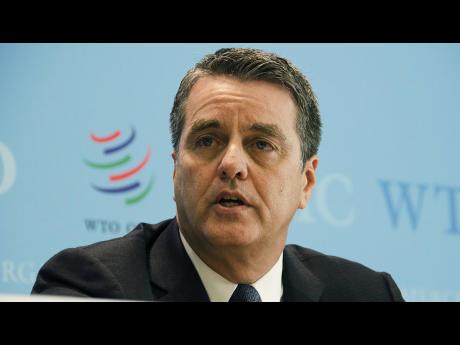Elizabeth Morgan | Selecting a new WTO director general
I noted The Gleaner’s editorial of Tuesday, May 19, ‘CARICOM on the WTO front line’, which dealt with the pending early departure of the incumbent director general (DG) of the World Trade Organization (WTO), Roberto Azevêdo of Brazil, and the selection of his successor. In the 2013 selection process, candidates sought the support of CARICOM members and visited the region in their campaigning. Hopefully, they will do so again. Of course, the mode depends on what COVID-19 permits. This selection process comes at a very difficult time for the WTO in the midst of a global public-health and economic crisis. The multilateral system is under stress.
We are seeing first hand that it is extremely testing to head a multilateral organisation with today’s leaders and in a highly charged political and economic atmosphere. I would not doubt that Mr Azevêdo’s decision was also motivated by trials encountered since being reappointed to his second four-year term in 2017.
As he demits office in September, the process has already begun to select his successor. This should be over nine months. If the procedures are strictly followed, it would end in January 2021, after he has left. The new DG is to be appointed, by consensus among the membership, three months before the incumbent demits office. If this timeline cannot be met, an acting DG would be appointed. The chair of the General Council, currently Ambassador David Walker of New Zealand, who is responsible for overseeing this process, seems to have signalled his intention to expedite it. Members (countries and customs territories) are to submit their nominations by July 9.
The WTO does not formally require regional rotation in the DG’s appointment, but regional representation can be considered in the selection process.
The DGs of the General Agreement on Tariffs and Trade were all from European countries – the United Kingdom, Switzerland, and the Republic of Ireland. Since 1995, the WTO DGs have been more diversified, reflecting the membership. They have come from Italy, New Zealand, Thailand, France, and Brazil. Neither an African national nor a woman has held this post so far. Of course, it requires a suitably qualified and experienced individual, male or female.
SIGNALLING INTEREST
Reports indicate that nationals of various members have started signalling their interest in being nominated. Africa is eyeing this post. Nationals of Benin, Egypt, Kenya, and Nigeria have indicated interest. The African Union (AU) would be assessing the nominees, hopefully, to endorse the strongest candidate by consensus. There is also apparently interest from nationals of New Zealand, the United Kingdom, and Spain. Others could emerge before July 9. Some major trading nations have not held this post such as Canada, Japan, India, China, and USA. Nationals of smaller members may also want to take a chance.
The WTO is an arena with some fierce gladiators defending their hold on money, power, and influence. They emphasise that it is a member-driven organisation; the members make the decisions. In reality, some members influence decisions more than others. If the WTO is “flawed, bureaucratic, and unwieldy”, that flows from the members. Ideally, it is the members, acting together, who must commit to reforming the organisation in their collective interest.
In its 25th year, the survival of the multilateral trading system is at stake. This COVID-19 crisis, however, is demonstrating that the WTO may be needed most now to revive the global economy and to secure the interest of its most vulnerable members. Trade cannot expand with isolationist policies.
This is a time, I think, for a neutral candidate. He or she, in this environment, must be a diplomat par excellence, an effective facilitator, a good negotiator, politically astute, a creative thinker, and a good administrator. He or she must also have stamina and courage and be committed to strengthening the multilateral trading system. The likely successor has to be a bridge-builder, contributing to raising the WTO above narrow self-interests, which have undermined its credibility as the regulator, administrator, and adjudicator of global-trade rules.
Let’s see whether the candidates emerging are endowed with Solomonic leadership abilities.
Elizabeth Morgan is a specialist in international trade policy and international politics. Send feedback to columns@gleanerjm.com.

